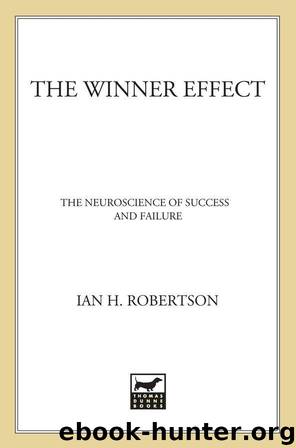The Winner Effect: The Neuroscience of Success and Failure by Ian H. Robertson

Author:Ian H. Robertson
Language: eng
Format: mobi
Publisher: St. Martin's Press
Published: 2012-10-15T18:30:00+00:00
Survival, evasion, resistance, escape
It was 26 October 1967. There was a blaze of lights on the plane’s control panel and an electronic howl of warning telling the pilot that missile radar had locked on to his A-4E Skyhawk fighter. The Yen Phu power station in central Hanoi mushroomed towards him and at 3,000 feet he released his bombs, just as the cloud of smoke from the missile battery spat the shining capsule of high explosive towards him, blowing off his right wing and hurling him out into the sky. That was the last John McCain saw of the inside of a plane until he prepared for his flight back home on 14 March 1973.
When McCain was captured he was not treated at the infamous ‘Hanoi Hilton’ POW compound – he was left to die of his injuries until the Viet Cong discovered that his father was an admiral, and soon to be head of the entire Pacific Command. In his 1995 book The Nightingale’s Song, Robert Timberg describes the broken, filthy and emaciated figure that was carried into the cockroach-infested cell in another POW centre, known as the Plantation. Such was his state, his two cellmates believed he would not survive the night. That was until they saw the strange and feverish light of his saucer eyes – a blaze of raw vitality that had him talking into the darkness until he fell asleep at 3 a.m.
McCain had had to offer some military information to get treatment for his severe injuries, otherwise he would certainly have died, so he signed one ‘confession’ statement. But when, in 1968, he was offered release, he refused with a torrent of ripe insults at the very senior American officials who had come to try to secure the return of a son of the elite. Their success would have served to demoralise hundreds of thousands of US servicemen who were already all too aware that most of the well-educated and the rich had avoided serving in Vietnam.
McCain’s refusal of release must have been all the harder when the cellmate who had nursed him back to life accepted freedom. McCain was to suffer another five years as a POW, much of it in solitary confinement.
In 1968, the Viet Cong were using torture and ‘mind-control’ methods very similar to those used by the Communist forces in Korea more than a decade earlier. During the Korean War of the early 1950s, mind-control methods had been put into operation, which had resulted in seemingly brainwashed captured US servicemen appearing on television condemning US capitalism and praising the wonders of Communism. How was it that young American servicemen could appear to praise a political system that was so alien to their own upbringing and education? How were they so apparently successfully brainwashed?
To try to understand this phenomenon, and at the same time to try to find methods to inoculate captured US forces against its effects, the US military began to adopt significant elements of the south-east Asian methods to train their own forces how to resist if they were taken prisoner.
Download
This site does not store any files on its server. We only index and link to content provided by other sites. Please contact the content providers to delete copyright contents if any and email us, we'll remove relevant links or contents immediately.
The Compound Effect by Darren Hardy(8941)
Tools of Titans by Timothy Ferriss(8363)
Nudge - Improving Decisions about Health, Wealth, and Happiness by Thaler Sunstein(7689)
Win Bigly by Scott Adams(7183)
Deep Work by Cal Newport(7059)
Rich Dad Poor Dad by Robert T. Kiyosaki(6602)
Principles: Life and Work by Ray Dalio(6413)
Pioneering Portfolio Management by David F. Swensen(6283)
Digital Minimalism by Cal Newport;(5747)
The Barefoot Investor by Scott Pape(5743)
Grit by Angela Duckworth(5601)
The Slight Edge by Jeff Olson(5409)
Discipline Equals Freedom by Jocko Willink(5377)
The Motivation Myth by Jeff Haden(5202)
You Are a Badass at Making Money by Jen Sincero(4916)
The Four Tendencies by Gretchen Rubin(4594)
Eat That Frog! by Brian Tracy(4519)
The Confidence Code by Katty Kay(4250)
Bullshit Jobs by David Graeber(4177)
